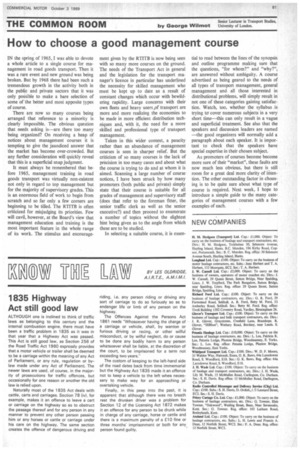THE COMMON ROOM
Page 87

If you've noticed an error in this article please click here to report it so we can fix it.
by George Wilmot University of London.
How to choose a good management course
IN the spring of 1965, I was able to devote a whole article to a single course for management in road goods transport. Then it was a rare event and new ground was being broken. But by 1968 there had been such a tremendous growth in the activity both in the public and private sectors that it was only possible to make a bare selection of some of the better and most apposite types of course.
There are now so many courses being arranged that reference to a minority is clearly impossible. The obvious question that needs asking is—are there too many being organized? On receiving a heap of notices about management courses it is tempting to give the jaundiced answer that the market has become over-crowded. But any further consideration will quickly reveal that this is a superficial snap judgment.
It must always be remembered that before 1965, management training in road goods transport was virtually non-existent not only in regard to top management but for the majority of supervisory grades. This is an enormous field of work to begin from scratch and so far only a few corners are beginning to be tilled. The RTITB is often criticized for misjudging its priorities. Few will cavil, however, at the Board's view that management education and training is the most important feature in the whole range of its work. The stimulus and encourage ment given by the RTITB is now being seen with so many more courses on the ground. The needs of the Transport Act in general and the legislation for the transport manager's licence in particular has underlined the necessity for skilled management who must be kept up to date as a result of constant changes which occur with bewildering rapidity. Large concerns with their own fleets and heavy users of transport are more and more realizing the economies to be made in more efficient distribution techniques and, with it, the need for a more skilled and professional type of transport management.
Taken in this wider context, a paucity rather than an abundance of management courses is seen in sharper relief. But the criticism of so many courses is the lack of precision in too many cases and about what the course is trying to do and at whom it is aimed. Scanning a large number of course notices, I have been struck by how many promoters (both public and private) simply state that their course is suitable for all grades of management and supervisory staff (does that refer to the foreman fitter, the senior traffic clerk as well as the senior executive?) and then proceed to enumerate a number of topics without the slightest hint being given as to the angle from which these are to be studied.
In selecting a suitable course, it is essen
tial to read between the lines of the synopsis and outline programme making sure that the questions, "for whom?" and "why?", are answered without ambiguity. A course advertised as being geared to the needs of all types of transport management, general management and all those interested in distributional problems, will simply result in not one of these categories gaining satisfaction. Watch, too, whether the syllabus is trying to cover numerous subjects in a very short time—this can only result in a vague and superficial treatment. See also that the speakers and discussion leaders are named —the good organizers will normally add a paragraph about each speaker. It is important to check that the speakers have special expertise in their chosen subject.
As promoters of courses become become more sure of their "market", these faults are now much less obvious, but there is still room for a great deal more clarity of intention. The other outstanding factor in choosing is to be quite sure about what type of course is required. Next week, I hope to introduce a simple guide to the many categories of management courses with a few examples of each.




































































































































